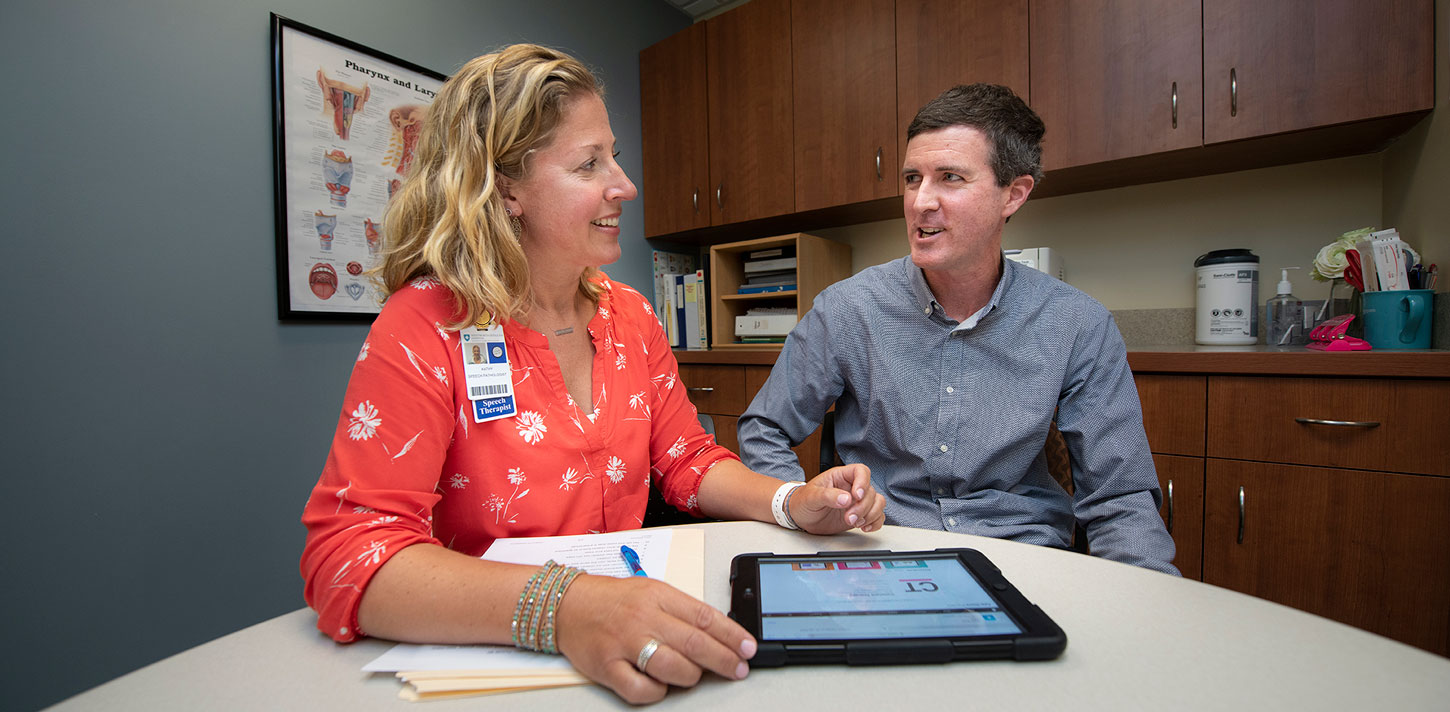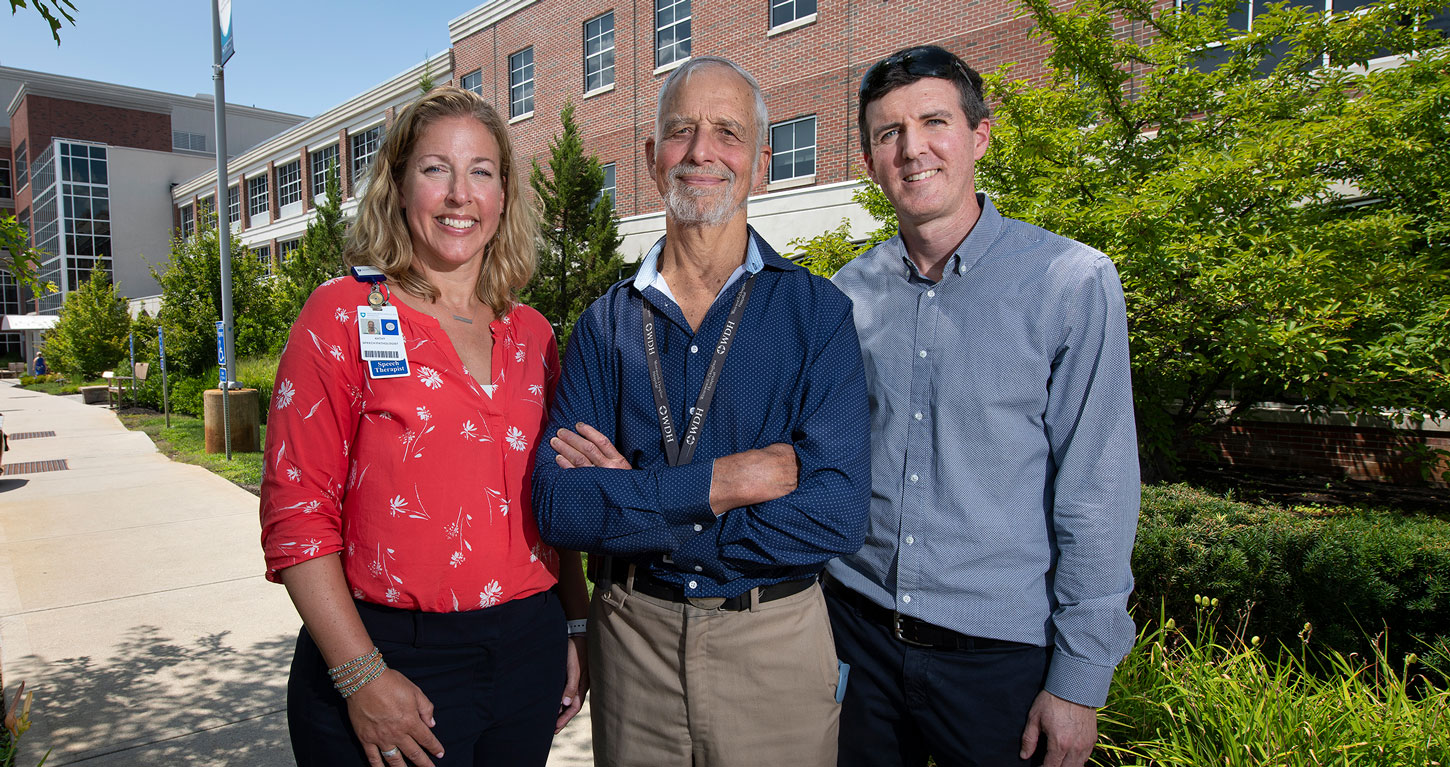11/21/2019
Speech Therapy Helps U.S. Diplomat Recover from ‘Silent Energy Attack’
Mark Lenzi was working at the United States Consulate in Guangzhou, China in 2017 as a U.S. State Department Security Engineering Officer when he started feeling lightheaded and experiencing sleep issues, sensitivity to light, and relentless headaches. Perhaps scariest of all was short-term memory loss, which Lenzi feared was a sign of early-onset dementia.
Lenzi was not alone. Some of his co-workers including his closest American neighbor were experiencing similar symptoms, as were his wife and children – aged 3 and 7 at the time – who had frequent bloody noses. These issues were initially attributed to smog levels in China, but it was soon apparent that the cause was something much more insidious.

Lenzi, along with some of his Guangzhou, China co-workers, was featured in a CBS 60 Minutes story that aired this past March. Lenzi was interviewed wearing tinted glasses, due to ongoing issues with light sensitivity. His ability to work in China was compromised: “I was forgetting common names of tools I use every day. I could not remember 5-digit number codes, which is essential to my job as a security engineer.”
The root cause of these problems has been characterized as “silent weaponry” in the form of a directed Radio Frequency (RF) energy attack in the microwave range that "bathes" a target’s living quarters in microwave energy. According to investigative reports, this “silent energy attack” has targeted U.S. diplomats in both China and Cuba.
In April 2018, Lenzi’s neighbor and coworker was medically evacuated home to the United States. Lenzi and his family followed: “When I was injured, one of my first thoughts was getting back to Wentworth-Douglass Hospital. I was born at Wentworth-Douglass. I went to school at UNH. Most diplomats are used to a very transient way of life – traveling constantly and moving frequently. My long-term relationship with this hospital was such a reassuring feeling for me, knowing I would feel completely comfortable here.”
Lenzi was initially evaluated at the University of Pennsylvania Center for Brain Injury and Repair, where he continues to be a part of an ongoing study of 41 affected diplomats from Cuba and China. The diagnosis: mild Traumatic Brain Injury (mTBI) which is often associated with athletes and football players. Says Lenzi about the University of Pennsylvania study: “It has been said that we are the only known people in human history to receive a diagnosis of traumatic brain injury without a blow to the head.”
“I underwent hours and hours of neuro-psychological tests which showed that I was clinically functioning at a very high level on certain tests while at the same time functioning at only the 8th percentile on other tests I should have had corresponding high scores on. When I was told I needed to do speech therapy, I got defensive, I was resistant, and I was angry. I thought speech therapy was for people who didn’t speak clearly.”
That’s how Lenzi began his work in October 2018 with Kathy V. Fagan, MEd, CCC-SLP, Department of Rehabilitation Services, Speech-Language Pathology at Wentworth-Douglass Hospital. Fagan is one of four speech-language pathologists who evaluate and treat concussions as well as many other neurologic diagnoses, voice disorders, swallowing, and cognitive/communication deficits.
Says Fagan, “Mark’s irritability and anger were real. These are classic post-concussion symptoms. Our approach to therapy is very specific. What is it that you need to get back to doing? With Mark, these were not only skills he needed for his work, but also at home with his young children.”
For Mark, multi-tasking is a real-life skill that his therapy needed to “mimic,” often by Fagan playing a story on the radio while Mark completed a separate exercise targeting a specific cognitive goal. He would then be asked about the story he heard. According to Fagan, “This is a big piece of cognitive therapy and cognitive endurance. We are training the brain to tolerate increasing stimulation and complexity of information needing to be organized or processed.
Says Lenzi, “Beyond the specific exercises, I had to learn how to harness my frustration. I’m a Type-A Engineer – and have always believed that if you work hard, you will succeed. This isn’t necessarily the case with some of these exercises. Beyond the exercises, Kathy taught me how to channel my frustration into positive action with less negativity.” Fagan adds: “We often say to our patients, you may not be able to do it in the same way or as quickly as you used to, but you will hopefully be able to use your strategies to achieve the same goal in the end. Together, we develop new skills and new strategies by talking with people to learn about their preferences, interests and understanding their personal goals for therapy.”
For Lenzi, this entailed memory exercises. In his previous jobs, he needed to memorize and recall 5-digit codes in real time: “I used to know dozens of codes in our embassies. But right before working with Kathy, I couldn’t even remember the code to my son’s pre-school.” Fagan developed strategies to help Lenzi remember number sequences, recalling them even an hour after purposely introducing distractions.
Wentworth-Douglass started its concussion program six years ago. Securing the approval for treatment at Wentworth-Douglass from both the University of Pennsylvania program and Lenzi’s neurology and neuromuscular medicine specialist in New York City was seamless: “I think Wentworth-Douglass Hospital’s affiliation with Massachusetts General Hospital meant that other national institutions immediately recognized the quality of its programs, and this was a real blessing to me and my family.”
These local ties have been crucial to Lenzi, "With proper diagnosis and treatment, my headaches no longer felt earth-shattering and my everyday functioning improved with patience and hard work.”
“This is not a neat, linear recovery. I would reach plateaus, have setbacks, and feel frustrated. Kathy showed me that recovery is not about instant gratification. Now there’s a trust level and gratitude that I can’t adequately express. I can be completely honest with Kathy."

Another important local connection was Wentworth-Douglass Chaplain Julien Olivier (pictured above with Lenzi and Fagan), whom Lenzi has known all his life: “While concussion is a metabolic condition, I now know that dealing with the spiritual impact of this injury is a sign of strength, not weakness.”
According to Fagan, “Working with Mark reinforced my love of what I do - how much you can help someone, how much you can be a part of positive, productive, and healthy change.”
For more information about Wentworth-Douglass Hospital Rehabilitation Services, Speech-Language Pathology, or Neuro-day Rehabilitation Program, call (603) 740-2101 or visit wdhospital.org/rehab.